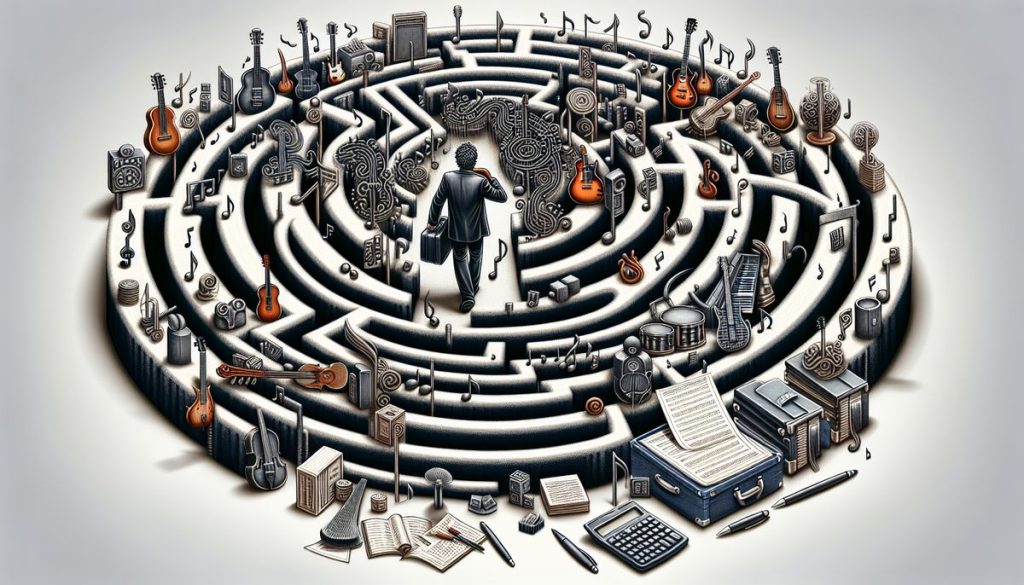Understanding Copyright and Trademark Law for Aspiring Musicians in the Modern Music Industry
Written by DJ Prodigee on Tue Feb, 2024
As an up and coming musical artist aspiring to make it in the modern music industry, understanding the intricacies of copyright and trademark law is crucial. This article delves into the essential aspects of copyright and trademark law for musicians in today’s music business landscape, providing valuable insights and guidance for navigating legal challenges and opportunities in the industry.
Key Takeaways
- Trademark law provides protection for musician’s stage names, band names, performing artist names, music producer names, and DJ names.
- Copyrightable material in music includes song recordings, lyrics, musical compositions, music videos, photographs, logos, and other visual materials.
- Proper preparation is key for musicians before signing a record deal, including ensuring their music business infrastructure is in order.
- Copyright law in music industry ensures proper exploitation and monetization of an artist’s work, with increased statutory damages for willful infringements.
- Trademark protection is essential for musicians to safeguard their brand and intellectual property rights in the music business.
The Wild World of Music Names
Trademark Law Protection for Musicians
So you’ve got a killer band name that’s going to make you the talk of the town, huh? Well, hold your horses, Picasso, because without trademark protection, that name might as well be written in sand at high tide. Trademark law is like a superhero cape for your band name, shielding it from the dastardly villains of the music biz who might want to swipe it faster than a guitar pick at a rock concert.
Let’s break it down with a list, because who doesn’t love lists?
- First, you gotta make sure your name isn’t already taken by some other hopeful with a dream and a garage.
- Second, slap a trademark on that bad boy to claim it as your own.
- Third, revel in the sweet, sweet security that comes with knowing your name is legally yours.
Remember, a trademark is not just a fancy legal term; it’s your brand’s best buddy in the cutthroat playground of the music industry.
And if you’re thinking, "But I’m just a small-time musician, do I really need this?" The answer is yes, yes, a thousand times yes! Because even if you’re playing to a crowd of ten in your local bar today, tomorrow you could be the next big thing – and you’ll want your name to be yours alone when that happens.
Bands, Brands, and Artist Names – Own Them Or Risk Losing Them
So you’ve got a killer band name that’s going to make you the talk of the town, huh? Well, hold your horses, Picasso, because if you don’t slap a trademark on that bad boy, you might as well call your band ‘Free for All’—because that’s exactly what your name will be. Own your name or watch it become someone else’s merch money.
Imagine this: you’re rocking out, fans are screaming your name, and then bam! Some other group on the other side of the country starts using your moniker. Worse yet, they’ve got the legal paperwork to prove it’s theirs. Now you’re stuck being ‘The Originals’ or, heaven forbid, ‘The Real Deal’.
Here’s the kicker: without a trademark, your claim to your name is as shaky as a one-legged drummer on a two-day bender.
To avoid a name-snatching horror story, here’s a quick checklist:
- Search for existing trademarks to ensure your name is unique.
- Apply for a trademark to protect your name across the nation.
- Monitor your trademark to keep sneaky copycats at bay.
Remember, in the music biz, your name is your brand, and your brand is your ticket to the big leagues. Don’t let someone else cash in on your riff-tastic genius!
Copyrights and Music Monetization
What Can Be Copyrighted?
So, you’ve penned a banger that’s going to take the world by storm, but before you start dreaming of swimming in a pool of cash like Scrooge McDuck, let’s talk about what you can actually slap a copyright on. Originality is key – your work has to be a brainchild that’s never seen the light of day before. And by ‘fixed in a tangible form’, we mean it’s got to be more than just an earworm; it needs to be recorded, written down, or otherwise captured outside of your noggin.
Here’s a quick rundown of what’s fair game for copyright in the music biz:
- Your toe-tapping tunes and the lyrics that get stuck in everyone’s head.
- That music video where you’re wearing a costume that’s part Lady Gaga, part space alien.
- Photos of you looking moody against an industrial backdrop.
- The snazzy logo that’s as iconic as your stage presence.
- All the witty banter on your website that makes fans feel like they’re your BFF.
Remember, if it’s not fixed, it’s as fleeting as your fame might be if you don’t protect your work!
Navigating copyright and trademark law is crucial for musicians in the modern music industry. Protect your creative work, understand legal rights, and seek professional advice for success.
Copyright Law Protection In Music
So you’ve got a killer track that’s going to take the world by storm, but before you start dreaming of swimming in a pool of cash like Scrooge McDuck, let’s talk about the not-so-sexy side of music: copyright law. It’s the shield and sword for your musical masterpieces, ensuring that no sneaky copycat can make a dime off your hard-earned beats without your say-so.
Copyrights in music are like the secret sauce that keeps your tunes yours. They cover everything from the melody that gets stuck in everyone’s head to the unique merchandise you might whip up. Think of it as your music’s DNA—totally unique and legally protectable. Here’s a quick rundown of what’s under the copyright umbrella:
- The underlying musical composition (the soul of your song)
- The sound recording (that sweet, sweet studio magic)
- Any created audio-visual work (like your mind-blowing music videos)
- Unique merchandise or apparel designs (your band’s logo on a hoodie, anyone?)
Remember, without the proper copyright protection, your music is like a house with the doors wide open. Anyone can waltz in and claim your tunes as their own. So, lock it down!
Now, if you’re thinking about using someone else’s track to give your Twitch stream that extra oomph, you better think twice. Without the appropriate permission, you might find your stream muted, or worse, hit with the dreaded copyright strike. And let’s not even get into the mess of royalty distribution and sync licensing—it’s like trying to solve a Rubik’s Cube blindfolded.
Preparing for the Music Business Jungle
What Steps Should A Musician Take To Prepare For Signing A Record Deal
So, you’re about to dive headfirst into the shark-infested waters of the music biz, and you’re thinking, "How do I not get eaten alive when signing a record deal?" First things first, make sure your music business infrastructure is rock solid. It’s like building a fortress before inviting the barbarians to parley. You wouldn’t want to find out that the drawbridge is missing when the label execs arrive, right?
Before you even think about charming the socks off a record label, you’ve got to have your ducks in a row. This means ensuring that all the rights to your tunes are snugly in your back pocket. Here’s a cheeky little list to keep you on track:
- Form a business entity (like a corporation or a fancy LLC)
- Double-check that you actually own your music (shocking, I know)
- Read and comprehend every single word of any contract (even the boring bits)
Remember, a record deal is not just a golden ticket to stardom; it’s a legal document that can bite you in the behind if you’re not careful.
And let’s not forget, the days of being discovered at a dingy dive bar are over. Today, you’ve got to be your own pop culture phenomenon or have a fanbase so big it could rival a small country. So, before you start sending your mixtape to every email address you can find, make sure you’re not just ready to perform, but also ready to sign on the dotted line without selling your soul (or your rights).
Trademark Protection of An Esports
Alright, listen up, future esports moguls! If you’re planning to dive into the digital gladiator arena, you better protect your gamer-tag like it’s the last slice of pizza at a LAN party. We’re talking about slapping a trademark on that bad boy faster than you can say ‘Pwned!’ Because let’s face it, in the esports world, your name is your battle standard—and you don’t want some random noob running off with it.
Here’s a quick rundown on making sure your digital alter-ego stays yours:
- File those trademark applications like they’re hot potatoes. Both at the federal and state levels, folks!
- Don’t forget to look beyond Uncle Sam’s backyard. Apply internationally to keep your name safe across the seven digital seas.
- Separate trademarks for your team name, logo, and your own epic gamer-tag? Yup, you need ’em all.
Remember, a trademark is not just a legal formality; it’s the shield that guards the realms of your brand. Without it, you’re just another face in the crowd of controller warriors.
So, whether you’re a lone wolf streamer or the next big esports franchise, get that trademark protection locked down. It’s like leveling up in the game of legal defense—no cheat codes necessary!
Conclusion
Well folks, there you have it! Copyright and trademark law in the music industry can be a wild ride, but understanding the ins and outs is key to making it in this crazy world of music. Remember, protect your name, own your brand, and rock on! Stay tuned for more legal tips and tricks for aspiring musicians. Keep jamming and keep it legal! 🎵🎸🎤
Frequently Asked Questions
What is the importance of trademark law for musicians in the modern music industry?
Trademark law provides protection for a musician’s stage name, band name, performing artist name, music producer name, and DJ name. It ensures that these names are exclusive and cannot be used by others in the same industry.
What can be copyrighted in the music industry?
Copyrightable material in the music industry includes song recordings, lyrics, musical compositions, music videos, photographs, logos, and other visual materials created by the artist.
How does copyright law protect music monetization?
Copyright law protects the rights of musicians to monetize their music by providing exclusive rights to reproduce, distribute, and perform their works. It also allows for licensing and cataloging of these rights.
What steps should a musician take to prepare for signing a record deal?
Before signing a record deal, musicians should ensure their music business infrastructure is in order. This includes forming a business entity, confirming ownership of rights, and preparing for negotiations.
Why is it important for musicians to own their artist, band, and brand names?
Owning artist, band, and brand names through trademark law is crucial to avoid the risk of losing them to others. It establishes exclusive rights and helps in building a strong identity in the industry.
What are the key considerations for a novice musician looking to monetize their music?
Novice musicians should consider guidelines to legally release and monetize their music. This includes understanding copyright laws, licensing requirements, and ensuring all rights are secured before entering agreements with third parties.






